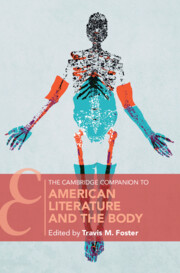Book contents
- The Cambridge Companion to American Literature and the Body
- The Cambridge Companion to American Literature and the Body
- Copyright page
- Contents
- Contributors
- Chronology of Publications and Events
- Acknowledgments
- Introduction
- Part I Genres
- 1 Bodies in Early US-Atlantic Theater
- 2 Sentimentalism and the Feeling Body
- 3 Slavery, Disability, and the Black Body/White Body Complex in the American Slave Narrative
- 4 Monstrous Bodies of the American Gothic
- 5 Bodies at War
- 6 Decolonizing the Body in Multiethnic American Fiction
- 7 Science Fiction’s Humanoid Bodies of the Future
- 8 Contemporary North American Transgender Literature
- Part II Critical Methodologies
- Further Reading
- Index
- Cambridge Companions To …
1 - Bodies in Early US-Atlantic Theater
from Part I - Genres
Published online by Cambridge University Press: 30 July 2022
- The Cambridge Companion to American Literature and the Body
- The Cambridge Companion to American Literature and the Body
- Copyright page
- Contents
- Contributors
- Chronology of Publications and Events
- Acknowledgments
- Introduction
- Part I Genres
- 1 Bodies in Early US-Atlantic Theater
- 2 Sentimentalism and the Feeling Body
- 3 Slavery, Disability, and the Black Body/White Body Complex in the American Slave Narrative
- 4 Monstrous Bodies of the American Gothic
- 5 Bodies at War
- 6 Decolonizing the Body in Multiethnic American Fiction
- 7 Science Fiction’s Humanoid Bodies of the Future
- 8 Contemporary North American Transgender Literature
- Part II Critical Methodologies
- Further Reading
- Index
- Cambridge Companions To …
Summary
In a 1703 discourse on the nature of comedy, Anglo-Irish dramatist George Farquhar declared “an English play is intended for the use and instruction of an English audience.” He further identified this audience as a “mixture of many nations” and as “a people not only separated from the rest of the world by situation, but different also from other nations as well in the complexion and temperament of the natural body as in the constitution of our body politick.”1 By “body politick,” Farquhar imagined an imperial nation defined by its variegation and collectivity. Theater scholars Jeffrey Richards and Elizabeth Maddock Dillon have adapted and applied Farquhar’s prescription for a national drama to the New World. Richards characterizes the American audience as “a changeable cluster of identities that individuals or groups might recognize as pertaining to them,” specifically a cluster of Irish, Black, female, and working-class identities that are not fixed or predetermined.
- Type
- Chapter
- Information
- Publisher: Cambridge University PressPrint publication year: 2022

